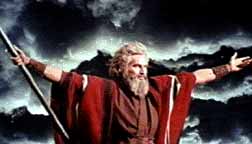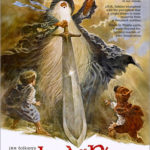What Do We Do About God?
For whatever reason, many in the Christian side of the publishing industry frown on allegory. Perhaps editors have seen too many representations of God-by-another-name. I don’t know if readers care, but I suspect editors and agents find this approach “not fresh.”
How, then, should a Christian speculative writer show God?
I’ve read some stories in which God is God. In other words, He is no different in the speculative world—science fiction or fantasy—than He is in the real world or as He would appear in a contemporary story.
Many others seem to shy away from a representative of God at all. Rather, the conflict is between a morally right group and a morally corrupt group with God perhaps being the catalyst for the former to live as they do. J. R. R. Tolkien wrote along these lines. Sauron, the great evil of Middle Earth, doesn’t exactly show up in Lord of the Rings, but his presence is more tangible than that of Ilúvatar, the Supreme Creator God who brought into being others of power.
C. S. Lewis approached showing God in a way that seems allegorical, but in reality was what he termed “supposal” (for further discussion of Lewis’s approach to fantasy, see “C. S. Lewis And Sub-creation”). He created the world of Narnia and essentially asked, If Jesus were to become incarnated there, what would He be like?
In a recent blog post about C. S. Lewis struggling to reach an unbelieving generation, Phyllis Wheeler, editor at Castle Gate Press, said
[noted lecturer Jerram Barrs] told us this week that Lewis’s prayer for the non-Christians reading his stories was that “they will fall in love with Aslan, and when they later hear of Jesus, they will recognize him.”
(“C. S. Lewis struggled to reach an unbelieving generation, too”)
I’ve taken a symbolic approach in my fantasy series The Lore of Efrathah. Except, I find it nearly impossible to convince those who have given me feedback that the rightful ruler of Efrathah isn’t a representation of God. And of course He is, though I made no intentional effort to model the character after Him. Since God is singular—good and all powerful and sovereign—a fictitious character with those qualities is hard to mistake for someone other than God, at least among other Christians.
Now Jesus—that’s another story.
 The Old Testament does an incredible job of preparing humankind for the Messiah by presenting a string of living, everyday folk who exhibited a quality or acted in a specific way or filled a particular role that mirrors who Jesus is and what He’s done. So Isaac became the sacrificial Son (and the ram, the substitutionary sacrifice); Moses was the Judge leading the people out of captivity; David was the victorious King, and so on.
The Old Testament does an incredible job of preparing humankind for the Messiah by presenting a string of living, everyday folk who exhibited a quality or acted in a specific way or filled a particular role that mirrors who Jesus is and what He’s done. So Isaac became the sacrificial Son (and the ram, the substitutionary sacrifice); Moses was the Judge leading the people out of captivity; David was the victorious King, and so on.
In the same way, fiction can represent Christ, rather than replicate Him, simply by portraying characters who lead the escape or sacrifice that others might live or provide the means of healing the wounded or become the long-awaited ruler.
Of course many stories have featured those characters, so perhaps the next innovative way of showing Christ is something other than what we typically think of Him. Perhaps we need a character who acts a bit more like the zealous Jesus cleansing the temple or the One telling Peter to stop acting like Satan or the rabbi sending away people who aren’t willing to sell everything.
The thing is, God the Father doesn’t act in predictable ways. He builds a nation by letting His people get pulled into slavery. He defeats an army of tens of thousands with three hundred shouting, pot-breaking torch wavers. He brings His Son into the world via a virgin. Jesus, being the image of the invisible God, is just as unpredictable. He paid taxes with a coin from a fish’s mouth, cursed fig trees to make a spiritual point, and include among His close disciples one He knew would betray Him.
We’d say people who act this way are thinking outside the box. In contrast, though, it seems to me our story representations of God and of Christ are quite inside the box. We seldom see God do anything unique or unpredictable in our fiction.
I don’t think depicting God in an overt way means we cannot show Him doing surprising and unexpected things. His nature is to do and think things that are different from our thoughts and ways, so our fiction would rightly show God losing to win or telling the protagonist to wait instead of go or comforting him instead of rescuing him.
Of course allegorical representations of God, supposal creations of Him, or symbolic renderings can do the same kinds of inventive, radical actions.
In short, I think a reflection of God in fiction, to be effective, should contain the unexpected.
In what books and with what ways have you seen an author successfully show God?










































God is very difficult to handle well as a character in fiction. Generally speaking, few do it well, and I tend to prefer the method of having his believers act according to his will. In my own novel, I had God speak directly to characters on a very limited basis. I wrung my hands a bit over that one, but I thought it was important to establish that there was actually a God in this world, and that he was sovereign over all of the other titular “gods” that various people believed in (or fell prey to). I chose what I thought was a minimalist, Samuel-like approach that I felt was consistent with the way God tends to communicate–either in a still, small voice, or loudly through his prophets. Apparently, even that little bit was too much for one of my reviewers, but fortunately I haven’t had too much negative reaction on it.
Most of the time, the representations of God in fiction just don’t ring true. It is difficult to put words in God’s mouth in the first place, and doctrine and theology tend to distort, even if only slightly, our perception of who he is and what he expects from us. The Jesus in the Randy Alcorn books is decent, but ultimately forgettable, perhaps because Alcorn keeps the reader at a respectful distance, and therefore does nothing particularly thought-provoking with him. Overstreet’s poetic and fantastic “mythic” portrayal is powerful and awe-inspiring, but ultimately a bit impersonal. Others have attempted, but rarely even come close.
The best, the absolute BEST representation of God as a character would be in JC Lamont’s Prophecy of the Heir. The novel’s premise is audacious enough in the first place, and when I saw that the pre-incarnate Christ was actually a character (known primarily as The Prince), I wasn’t sure that the author could pull it off.
Was I ever surprised.
Not only did JC manage to portray the character with reverence and respect, she brought a depth of understanding to him that I have never seen before in a novel. The closest I could come would be Aslan in the Chronicles, but even that was a step or two removed. Lamont’s novel is a unique sort of supernatural historical epic in that sub-genre known as “literary apologetics,” and it scores on so many levels. It’s not the standard fare for many of the fantasy/sci-fi lovers here, but I can say without reservation that not only does it pull off the challenge, it does so in a way that I have rarely seen paralleled.
High praise for Prophecy of the Heir, Robert. Thanks for sharing.
I agree with you that it is very difficult to show God effectively in fiction. I know Sharon Hinck did so in her Sword of Lyric series, and I thought they were effective, but a few people on the blog tour thought she pulled a deus ex machina when God acted. That’s another problem writers have to dodge.
So it’s great to hear about a book that navigated all the boulders and bumps and showed God in a powerful way.
BTW, I tried to remember in what way God was a part of Jeffrey Overstreets Aurelia’s Colors books, and I drew a blank. For a time I thought the Keeper was an allegorical representation of Him, but by the end, when multiple Keepers showed up, it was clear that wasn’t so. What am I forgetting? (Quite a lot, I know! 😉 )
Becky
Since I have read only the first book, I guess I kind of assumed the Keeper was supposed to be representative of God.
I have to say the most unexpected and enjoyable “Christ” I have seen in fiction is found in Anne Rice’s two books, Out of Egypt and Road to Cana. Rice had just come back to faith after a long time lost in the darkness (and writing about it in a slew of vampire and other horror-type books) and she decided that henceforth she would write only for the glory of God. It blows me away that she would do so by writing the story of Jesus, from first person viewpoint, starting from when He was 8 years old, and use the book to explore the question of “When did Jesus know He was divine?” Wow. Gotta hand it to her, that took guts. The second book picks up the story when Jesus is an adult, and the people around Him can’t figure out why this man who showed such promise as a youngster is still unmarried, but in love (!) and hanging around the Galiean backwater. Both of these books startled and disturbed me, but in a way that deepened my faith. There are many things in them that I had never thought about before, including the author’s well-researched portrayal of the times in which Jesus lived. Unfortunately some time after the second book came out Rice announced she was leaving the Church (she was Catholic) and she has subsequently gone back to writing her horror books. She had meant to write a third book about the life of Chrust but as of yet she has not, and I wonder if it could match those first two, given her waning faith. But, like I said, wow. One of my favourite scenes in the second book is when Jesus is being berated by one of the Teachers of the Law for abandoning his opportunity to study at the Temple under the Rabbis there, telling him he was wasting his life, etc. His response? “Just watch how this carpenter will remake the world.”
Lisa, that is a powerful line, no doubt.
I never read Anne Rice’s “Christ books,” because I had such conflicting feelings. I’ve never been a big fan of Biblical fiction because from my perspective the writer has to walk such a thin high wire between what is true and what is story. From all I read about Anne Rice’s efforts, she erred on the side of story—not a good thing, in my book, when we’re talking about God’s revelation~
On top of that, I’ve never heard from someone who actually read the books. (I didn’t go looking for reactions to them either). So I find your response to them interesting. I’m curious if what disturbed you was something truthful or something from her story. I’ve certainly been disturbed by good stories because they make me think of things in a different way, but I’ve also been disturbed because they say something untruthful in such a compelling way, it’s heartbreaking to think of how they might mislead others.
At any rate, it’s great that the outcome for you was a deeper faith. Glad to know God used those stories in that way.
As far as Rice’s books showing God and/or Christ, she, of course, was making that her central point, although, perhaps, she was trying to humanize Jesus more than show Him as God. Is that an accurate statement?
Becky
Well thought and written.
Thanks, Martin. I appreciate the feedback. I actually think portraying God and Jesus in our stories might be the greatest challenge Christian writers face.
Becky
Amen to that, Becky!